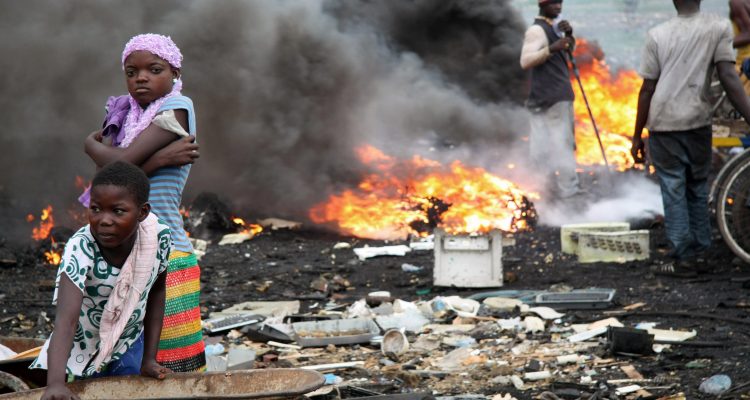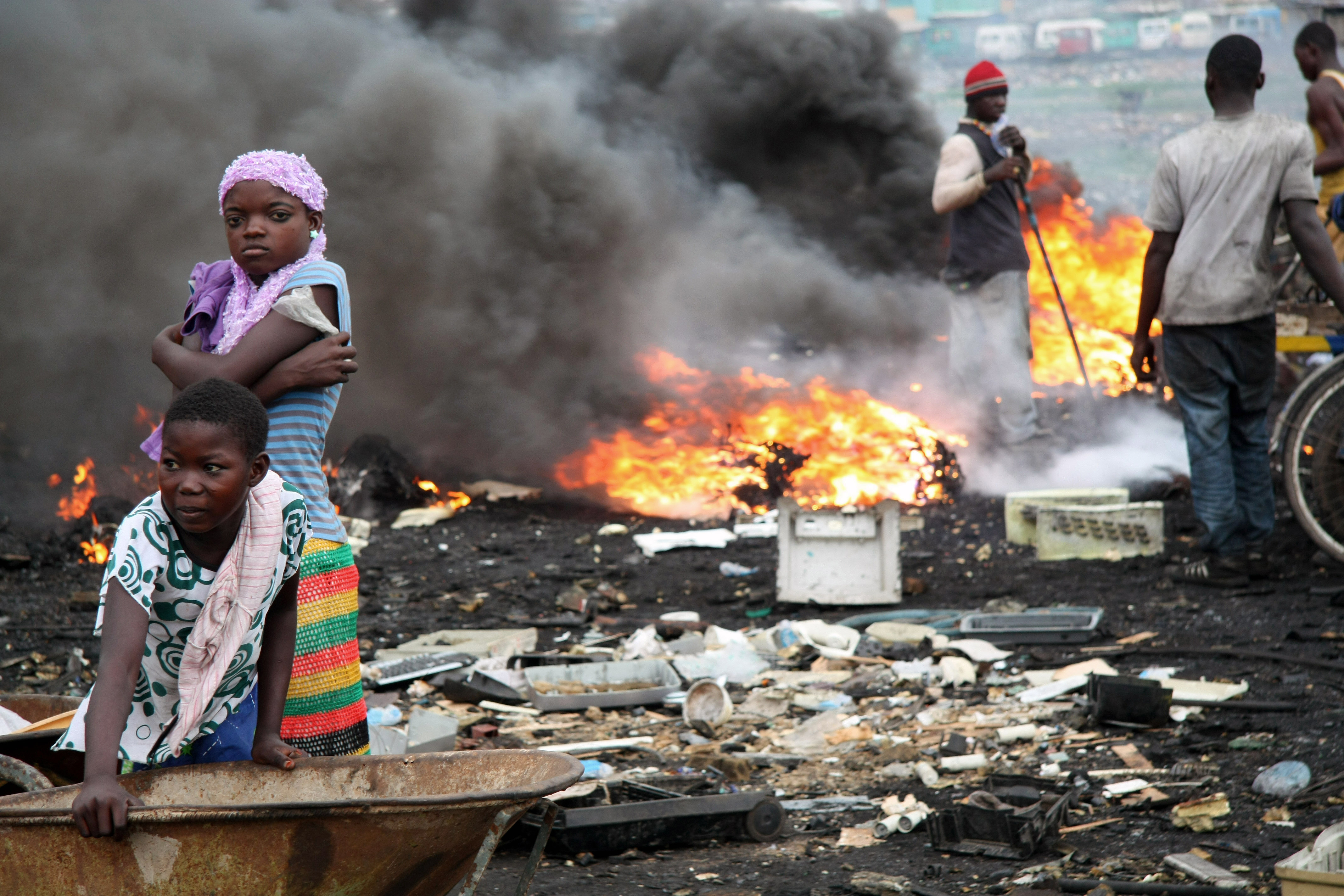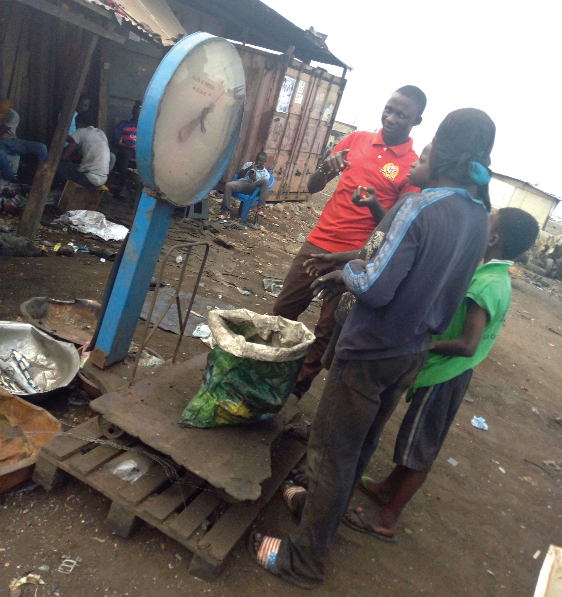
Deafening sounds from hammers that strike ferrous metals can be heard from all angles of the squatter enclave.
Clusters of thick, dark smoke emanate from the burning of bucket teeth, ground engagement tool, dozer tracks, foundry steel, car bodies, light gauge, heavy metal steel, electronic products and other scrap material fill the atmosphere, blurring vision and causing teary eyes.

The young, the old, male and female are performing one task or the other in the chain of activities associated with the scrap metal business.
From dawn to dusk, they search through what is known as the Ndirande’s biggest dump site for scrap metals waste materials, in search of worn out metals, and other electronic waste to extract copper, brass aluminum and other useful matter. It is what they do for a living. But, first, it feeds them, then kills them slowly.
This scrap metal dump site located at Kwachinseu- Ndirande slum in Blantyre commercial city of Malawi is not only a business centre for dealers in scrap metals but also a home for many inhabitants.
Most of the people, who live in this slum area, are from all walks of country’s regions North, Central South while others are foreigners from Burundi and Rwanda.
They live, work, dine and wine in that part of the city oblivious of the hazardous conditions they are exposed to daily. The most affected in this area are children who engage in all forms of work that contravenes the laws of the country.
Child labour
Among the dealers in this scrap metal business are children who should be in school but who mortgage their future and put their lives on the line. They join the crew of scavengers at the site and do work that weigh them down physically and psychologically.
One such child is Wyson Tholo, a 14-year-old student of Namalimwe primary school in the same slum who has been in the scrap business since 2012.
I met him at the scrap line about 11 a.m. on Thursday, June 5; he was busy scavenging for the goodies. Armed with a magnet, a wheel barrow and a sack, he moved from one place to the other, rolling the magnet to attract magnetic materials.
I followed him to a base where about 10 others almost his age, were also working on their wares. One of them who gave his name as Moses Yesaya, a 17-year-old a Form two student at Nyambadwe private secondary school, confessed to have left the class at the blind side of his teacher to work at the site.
“I decided to come and work here to get some money for my upkeep because I live with my sister in Mbayani another slum within Blantyre. She is a vegetable seller and cannot take care of all my needs,” he said.
Meanwhile after about 30 minutes, Wyson had sorted out the goodies and was ready to mount it on a scale that had been planted there by his “boss.” He placed the items on the scale and the reading stood at 50 kilograms which fetches K3, 000, 00 against 60per kg.

An excited Wyson told me that it was a sign of a good day. “On a good day, I can make more than K3, 000, 00 and at least K11, 000, 00 a week. He works under a “master” who buys his wares and resells to others in the chain.
The pathetic
Without protective clothing or any efficient tools to ply their trade, they handle the metals with bare hands and burn the scrap metals waste in a very crude manner that emit poisonous gases into the atmosphere. This practice leaves the area and its surroundings filled with polluted air that exposes the people to health risks and respiratory diseases.
Wyson threw more light on the side effects of the scrap business, saying: “It is a difficult thing to do because sometimes the metals can hit your head, eyes and other parts of your body. At times, we cough so much after work and have sleepless nights. But we cannot stop it because we eke a living from it.”
Ndirande resident Peter Chitedze aged 54 says side effects the scrap metal business has on the people and the public is a major concern that needs to be looked at, especially when there are dire health and environmental consequences.
For instance, even though the place is very unhygienic, food vendors and fruit sellers carry their wares around for the public to buy and eat.
Also, livestock such as chickens, pigs feeds on piles of refuse that are dumped around. These farm stocks are later slaughtered and their meat sold to members of the public.
There are no figures to show the number of deaths that result from the risky lifestyle in this area but it is certain that many lives are lost every now and then.
Importations
Despite the physical and health risks the scrap metal business poses, it continues to thrive because of the insatiable taste for second-hand electronic goods be it cars and electronics which end up as scrap metal.
Hundreds of tonnes of these used products are mostly imported from the China and Japan.
Call
Key state agencies such as the Malawi Bureau of Standards, Consumer Association of Malawi, and the Customs Division of the Malawi Revenue Authority (MRA) need to collaborate effectively to enforce the regulations on the importation and dumping of second-hand electronic products on Malawian markets that end up as scrap metal.















Not very sure about the technicalities of the topic, but I would like to appreciate the good writing skills of the author. This is real good writing. Keep it up and keep and make your writing bigger and greater